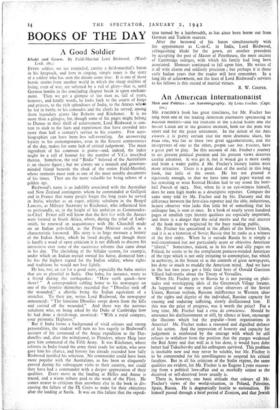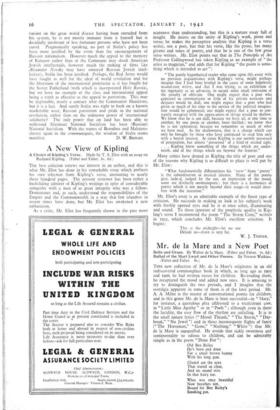An American Internationalist
MR. 1,ISC.HER'S book has great timeliness, for Mr. Fischer has long been one of the leading American journalists speciausing miss= matters—and the relations of the United Slates aria the Soviet Union are of the greatest moment, both tor the joint war enort and for the peace settlement. In the defeat of the Axis rowers it is pretty certain that the most dramatic share, the beau role, win fan to these two great aggiomerauons, and the interpreters of one to the other, people. lie Mr. riscner, have a great part to play. So this account of Mr. Fischer's journey to ms present political position and his present views deserves careful attention. It wul get it, but it would get it more easily and from a wider public if Mr. Fischer's literary habits were more attractive. There is a great deal of the useful in this long book, but little of the sweet. He has not pruned it rigorously enough, so that we have time and paper wasted on his rewriting of what Konrad Heiden had to say aoout the beer- hall Putsch of 1923. Nor, when he is an eye-witness himself, does he earn high marks as a descriptive reporter. Compare the same story told by Mr. Fischer and by Mr. Duranty and the difference between the first-class reporter and the able, industrious, honest observer who lacks that little bit of something that his colleague has, is seen at once. In a book of nearly seven hundred pages of smallish type literary qualities are especially important, and there is a danger that the solid merits and the real interest of the book may be neglected by the busy reading public.
Mr. Fischer has specialised in the affairs of the Soviet Union, and it is as a historian of Soviet Russia that he ranks as a witness of the first order. When he is outside Russia he is simply a well-intentioned but not particularly acute or objective American "liberal." Sometimes, indeed, as in his few and silly pages on Poland, he seems to be the complacent panacea-minded American of the type which is not only irritating to contemplate, but which in authority, in the Senate or at the controls of great newspapers, has done so much to muddle the American mind. And we have in the last two years got a little tired here of Oswald Garrison Villard half-truths about the Treaty of Versailles.
When Mr. Fischer gets to Russia he is not passing on plati- tudes and worshipping idols of the Greenwich Village forums. As happened to many or most close observers of the Soviet Union, Russian realism, Russian indifference to Western ideas of the rights and dignity of the individual, Russian capacity for causing and enduring suffering, slowly disillusioned him. If this was the price of progress, was it worth the price? For a long time, Mr. Fischer had a crise de conscience. Should he announce his disillusionment or still, by silence at least, encourage the illusions which fed the popular - front organisations in America? Mr. Fischer makes a reasoned and dignified defence of his action. And the impression of honesty and capacity for judgement is reinforced by the courage with which he still refuses to withdraw from the position that the purges weakened the Red Army and that well as it has done, it would have dale better had Tukachevsky and his colleagues survived. This problem is insoluble now and may never be soluble, but Mr. Fischer is to be commended for his unwillingness to suspend his critical faculties. But in all his criticism of the Stalin regime, the same qualities are evident, for Mr. Fischer is no Eugene Lyons recover- ing from a political love-affair and as morbidly unjust as the deceived or self-deceived lover usually is.
There is, however, one basic attitude that colours all Mr. Fischer's views of ;11e world-situation, in Poland, Palestine, Spain, Russia. He is dogmatically hostile to nationalism He himself passed through a brief period of Zionism, and that Jewish
variant on the great world disease having been extruded from his system, he is not merely immune from it himself but is decidedly intolerant of less fortunate persons who have not been cured. Pragmatically speaking, no part of Stalin's policy has been more justified by the event than the encouragement of Russian nationalism. However much the appeal to the memory of Kutusov rather than of the Commune may shock American Jewish intellectuals, however much the making of films like Alexander Nevsky may have annoyed Russian Jewish intel- lectuals, Stalin has been justified. Perhaps, the Red Army would have fought as well for the ideal of world revolution and for the liberation of the international proletariat as it has fought for the Soviet Fatherland (with which is incorporated Holy Russia), but we have no example of the class and international appeal being a tenth as effective as the appeal to patriotism. This may be deplorable, nearly a century after the Communist Manifesto, but it is a fact. And surely Stalin was right to bank on a known marketable asset, Russian patriotism and pride in the national revolution, rather than on the unknown power of international solidarity? The only power that on land has been able to withstand (German) National Socialism has been (Russian) National Socialism. With the names of Borodino and Malojaro- slavets again in the communiqués, the wisdom of Stalin seems



























 Previous page
Previous page